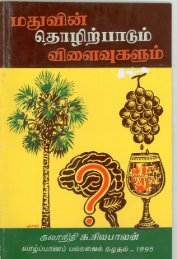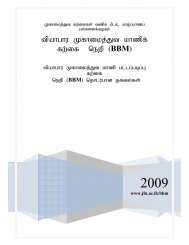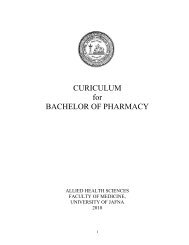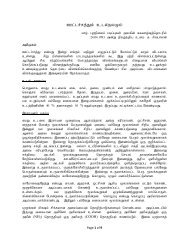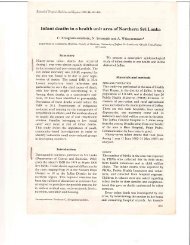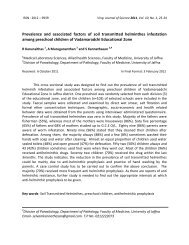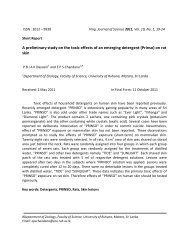MANUAL PHYSIOLOGY PRACTICAL - Repository:The Medical ...
MANUAL PHYSIOLOGY PRACTICAL - Repository:The Medical ...
MANUAL PHYSIOLOGY PRACTICAL - Repository:The Medical ...
You also want an ePaper? Increase the reach of your titles
YUMPU automatically turns print PDFs into web optimized ePapers that Google loves.
FM/UOJ<br />
Several added sounds can be heard in diseased lungs. Common sound heard is<br />
crepitation which is crackling or bubbling sound. Another sound is ronchi produced by air<br />
passing through partially obstructed air ways.<br />
Investigation<br />
Many investigations could be done and a common investigation is X – ray<br />
examination<br />
Function tests:<br />
Lung function tests are carried out in patients for physiological diagnosis in the<br />
following circumstances:<br />
1. To give an objective assessment of patient’s disability.<br />
2. To follow the progress of a decease and the effect of treatment.<br />
3 To differentiate the possible causes of dyspnoea.<br />
4. To assess patients before anesthesia especially for thoracic surgery.<br />
Perform the following tests and record the parameters of the class.<br />
a. Maximum Breathing Capacity [MBC]:<br />
Use douglas bag and dry gas meter . After setting up, collect the expired air with<br />
maximum possible dept and rate for 30 seconds. Measure the volume and<br />
calculate liters/minute.<br />
b. Vital Capacity:<br />
Use spirometer as described before.<br />
c. FEV, FEV 1 %-<br />
Use spirometer to measure and calculate as done before.<br />
d. Peak Expiratory Flow Rate:<br />
Use peak expiratory flow meter. Ask the subject to take a deep inspiration and<br />
expel as fast possible through the peak flow meter. Hold the meter horizontally;<br />
bring the rider to zero before each reading. Record three readings and take the<br />
maximum reading.<br />
Respiration<br />
Page | 76



